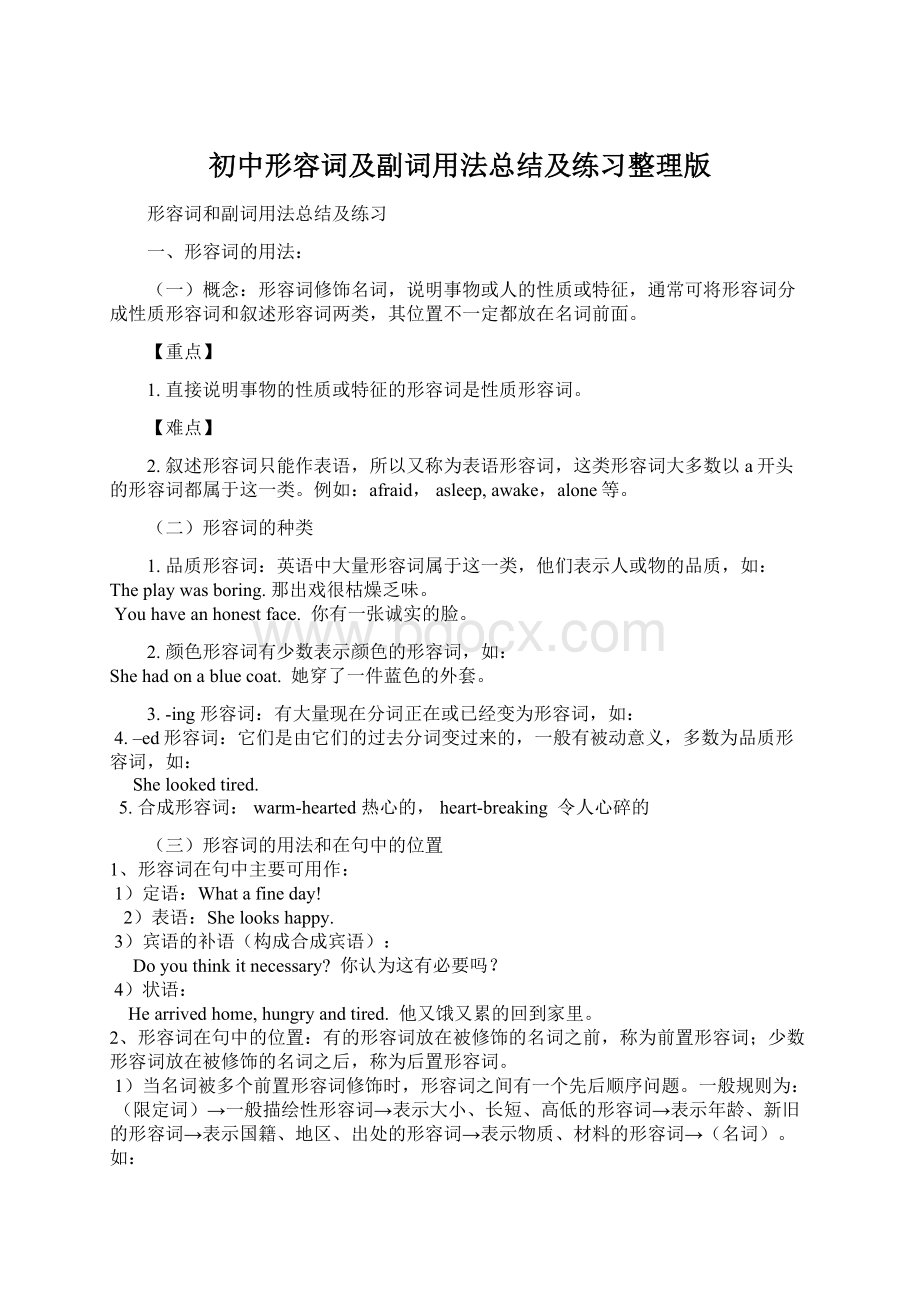初中形容词及副词用法总结及练习整理版文档格式.docx
《初中形容词及副词用法总结及练习整理版文档格式.docx》由会员分享,可在线阅读,更多相关《初中形容词及副词用法总结及练习整理版文档格式.docx(17页珍藏版)》请在冰豆网上搜索。

Hearrivedhome,hungryandtired.
他又饿又累的回到家里。
2、形容词在句中的位置:
有的形容词放在被修饰的名词之前,称为前置形容词;
少数形容词放在被修饰的名词之后,称为后置形容词。
1)当名词被多个前置形容词修饰时,形容词之间有一个先后顺序问题。
一般规则为:
(限定词)→一般描绘性形容词→表示大小、长短、高低的形容词→表示年龄、新旧的形容词→表示国籍、地区、出处的形容词→表示物质、材料的形容词→(名词)。
如:
Thereisafamousfineoldstonebridgenearthevillage.
村子附近有一座著名的漂亮的古代石桥。
2)当形容词词组相当于一个定语从句时,或形容词用来修饰somebody,something,anything,nothing
等的时候,便会出现后置形容词。
Theboyinterestedinmusicismybrother.
对音乐赶兴趣的那个男孩是我弟弟。
Doyouhaveanythinginterestingtotellus?
你有什么趣闻告诉我们吗?
二、副词的用法:
用以修饰动词、形容词或其他副词的词叫做副词。
not(不),here(这里),now(现在)。
不少副词同时也可用作介词或其它词类。
Haveyoureadthisbookbefore?
(副词,作时间状语)你以前读过这本书吗?
Hewillarrivebeforeteno’clock.(介词,beforeteno’clock是介词短语,作时间状语)他将在10点钟前到达。
(二)副词的种类
1、时间副词有三类:
always,often,usually,sometimes,never,ever,hardly等一般位于系动词、情态动词和助动词之后,实之前义动词
1)表示发生时间的副词:
It’sbeginningtorainnow!
现在开始下雨了!
2)表示频繁程度的副词,也称频度副词always,often,usually,sometimes,never,ever,hardly等一般位于系动词、情态动词和助动词之后,实之前义动词:
Sheoftenchangeshermind.
她常改变主意。
3)还有一些其他表示时间的副词:
Hehasjusthadanoperation.他刚动过手术。
2、地点副词:
1)有不少表示地点的副词:
Sheisstudyingabroad.
她在国外留学。
2)还有一些部分与介词同形的副词。
它们与介词同形,跟宾语的是介词,否则是副词:
①用作介词:
Standup!
起立!
②用作副词:
Acatclimbedupthetree.
猫爬上了树。
3)以where构成的副词也是地点副词:
It’sthesameeverywhere.
到处都一样。
3、方式副词
1)英语中有大量方式副词,说明行为方式(回答how的问题):
Howbeautifullyyourwifedances.
你夫人舞跳的真美。
2)还有相当多的副词,表示某些情绪:
Shesmiledgratefully.
她感激的笑了笑。
3)还有一些以-ly结尾的副词,表示动作发生的状况:
Heleftthetownsecretly.他悄然离开了这座城市。
4、程度副词和强调副词
1)程度副词可修饰动词,表示“到某种程度”:
Isshebadlyhurt?
她伤得重吗?
[说明]这类副词除修饰动词外,还可修饰形容词(a)或另一副词(b):
a.fairlysimple相当简单quitecorrect完全正确
b.wonderfullywell好极了doitveryquickly干得很快
2)much是一个特殊的程度副词,它可以:
a.修饰形容词等:
I’mnotmuchgoodatsinging.我唱歌不太好。
b.修饰比较级:
Yousingmuchbetterthanme.你比我唱的好多了。
Theirhouseismuchnicerthanours.他们的房子比我们的好多了。
5.疑问副词和连接副词
1)疑问副词:
疑问副词用来引导特殊问句:
how:
Howisyourgrandmother?
你奶奶身体好吗?
where:
Wheredoesshecomefrom?
她是哪儿人?
when:
Whencanyoucome?
你什么时候能来?
why:
Whywashesolate?
他为什么来得这么晚?
2)连接副词:
连接副词意思和词形都和疑问副词一样,但都引导从句或与不定式连用:
how:
Doyouknowhowtostartthismachine?
你知道这台机器怎样启动吗?
where:
Idon’tknowwherehelives.我不知道他住在哪儿。
(引导宾语从句)
Tellmewhenyou’llbeready.告诉我你什么时候准备好。
That’swhyIcameround.这就是我来的原因。
(引导表语从句)
6.一些其它类型的副词,如表示方向的副词:
Let’sgoinside.咱们到里面去。
Taketwostepsforward.向前走两步。
(三)副词的位置
1.副词修饰动词时,通常可以放在句首、句中或句末。
UsuallyIdomyhomeworkintheevening.(句首)通常我晚上做家庭作业。
Ioftengetupatsix.(句中)我常在6点起床。
Pleasespeakslowly.(句末)请慢慢说。
2.副词修饰形容词或副词时,通常放在形容词或副词的前面如:
Theseflowersarequitebeautiful.(在形容词前)这些花相当漂亮。
Heworksveryhard.(在副词前)他工作很努力。
▲但也有例外,如:
Sheisoldenoughtogotoschool.(在形容词后)她已到了上学的年龄。
3.按一般规则,既有地点状语又有时间状语时,地点状语应放在时间状语之前。
Wehadameetingintheclassroomyesterdayafternoon.
我们昨天下午在教室开了一个会。
HewatchedTVathomelastnight.他昨晚在家看电视。
[说明]①形容词一般修饰名词,副词一般修饰动词、形容词或副词。
②一些形容词后加上-ly可以变成副词,如slow-slowly,quick-quickly,careful-carefully等。
【基础练习】
(一)用所给词的正确形式填空
1.TheGreensare
_____
(happy)toliveinthis
_____(noise)street.Theyhavedecidedtomovetoanotherplace.
2.Thepandahasbeen
______
(die)forabouttwomonths.
3.Ilikeherdress.Itlooksvery
(beauty).
4.Don’tfeel
(worry)aboutyourchild.Thewholeclasswouldbe
(friend)tothenewclassmate.
5.The
(finally)examsusuallytakeplaceattheendofJune.
6.It’s
____
(possible)foranordinaryplanetoflytothemoon.
7.It’sa
(please)tripforallofus.
8.ThechildreninChinaarelivinga
(color)life.
9.Itwasan
(amaze)match.Itamazedus.
10.Hefeltvery
(sleep)andfell
(sleep)soonwhenhelayinbed.
11.Weallhadavery
(enjoy)timeattheparty.
(二)选择最佳答案
()1.Theseorangestaste_______.
A.good
B.well
C.tobegood
D.tobewell
()2.Ican’tpay________asheaskedfor.
A.aashighpriceB.asahighpriceC.ashighpriceD.ashighaprice
()3.—Wearegoingtoseeafilmthisevening.Whynotgowithus?
—Ihavetodomanythingsthisevening.I’m_______,yousee.
A.free
B.glad
C.sorry
D.busy
()4.—Mum,Billiscomingtodinnerthisevening.
—OK.Let’sgivehim
___
toeat.
A.somethingdifferent
B.differentanything
C.anythingdifferent
D.differentsomething
()5.The
personistalkingwiththedoctor.
A.ill
B.sick
C.illness
D.sickness
()6.Thedayisbrightand_______.Let’sgoforawalk.
A.sunny
B.dark
C.cloudy
D.windy
()7.Look!
_______beautifulthatlakeis!
A.What
B.How
C.Howa
D.Whata
()8.---Iwon'
tgototheGreatWalltomorrow.
---Iwon'
t,______.
A.neitherB.eitherC.tooD.also
()9.Helikestodosomereadinginthemorning,Ilikeit,_____.
A.tooB.eitherC.neitherD.also
()10.Thatmathsproblemis______difficult______nobodycanworkitout.A.too;
toB.very;
thatC.so;
thatD.very;
but
()11.—What’sonthedesk?
—It’s
.
A.anewgreenbag
B.newgreenbag
C.agreenmewbag
D.abagnewgreen
()12.Thenightwasvery___,sohehadtotakeoffhisshoes___.
A.quiet;
quietlyB.quite;
quicklyC.late;
quickD.quite;
quietly
情况
构成方式
原级
比较级
最高级
一般情况
加-er或-est
new
long
newer
longer
newest
longest
以e结尾的词
加-r或-st
fine
late
finer
later
finest
latest
以“辅音+y”结尾的词
变y为i再加-er或-est
early
happy
earlier
happier
earliest
happiest
重读闭音节的词末尾只有一个辅音字母
先双写辅音字母,再加-er或-est
hot
thin
fat
hotter
thinner
fatter
hottest
thinnest
fattest
()13.He____toschooltocleanhisclassroom.
A.alwayscomesearlyB.comesalwaysearly
C.alwaysearlycomesD.comealwaysearlier
()14.Igotup____today.
A.laterB.morelatelyC.latelyD.late
()15.Alice___goestoschoolatseven.
A.usualB.usuallyC.hardD.alittle
1-5ADDAB6-10ABBAC11-15AAADB
三、形容词的比较等级:
(一)形容词的比较级和最高级的构成
1.单音节词和少数双音节词的比较级和最高级的构成
2.多音节词和部分双音节词在其前面加more或most。
原级
比较级
最高级
useful
moreuseful
mostuseful
difficult
moredifficult
mostdifficult
delicious
moredelicious
mostdelicious
3.有几个形容词的比较级和最高级属于不规则变化。
比较级
good/well
better
best
bad/ill
worse
worst
many/much
more
most
little
less
least
far
farther
farthest
old
older
oldest
(二)形容词比较级的用法
1.形容词的比较级可以单独使用:
Bemorecarefulnexttime.
下次小心点。
Whichbookisbetter?
哪本书更好?
2.也可以和than连用,表示两者相比,than后可以跟:
a.
名词或代词:
Heisolderthanme/I.他年龄比我大。
b.
动名词:
Skiingismoreexcitingthanskating.滑雪比滑冰更刺激。
c.
从句:
Iwasabettersingerthanhewas.我唱歌比他好。
(三)
形容词比较级的修饰语
1.形容词比较级前可加much,alot,abit,alittle,slightly之类表示程度的状语:
He’sfeelingmuchbettertoday.他感到今天好多了。
2.也可在比较级前any,no,some,even,still这类词:
Doyoufeelanybettertoday?
你今天感觉好一点了吗?
3.比较级前还可加其他表示数量的词:
Mysisteristenyearsyoungerthanme.
我妹妹比我小十岁。
(四)形容词比较级的特殊用法
1.和more有关的词组:
1)themore…themore… 越……就越……。
Theharderyouwork,thegreaterprogressyou'
llmake.
越努力,进步越大。
2)nomorethan与…一样。
TheofficialscouldseenomorethantheEmperor.
官员们看到的和皇帝一样多。
3)morethan 超过,不只是。
Therearemorethantwothousandpeopleinthehall.
2.和less有关的词组
1)lessthan
不到…不太:
Itwasreadyinlessthanaweek.
2)nolessthan多达
不少于
Nolessthan2millionpeoplecame.
至少来了2百万人。
3)moreorless基本上
大体上
大约
Theworkismoreorlessfinished.这项工作基本上完成了。
3.还有as+形容词或副词原级+as
1)not…so/as…as。
Hecannotrunso/asfastasyou.他没你跑得快。
2)当as…as中间有名词时采用以下格式:
①as+形容词+a+单数名词/;
②as+manymuch+名词。
Thisisasgoodanexampleastheotheris.
这个例子和另外一个一样好。
Icancarryasmuchpaperasyoucan.你能搬多少纸,我也能。
3)表示倍数的词或其他程度副词做修饰语时,放在as的前面。
Thisroomistwiceasbigasthatone.这房间的面积是那间的两倍。
Yourroomisthesamesizeasmine. 你的房间和我的一样大。
(五)形容词最高级用法
1.the+最高级+比较范围
1)形容词最高级前通常必须用定冠词the,例如:
TheSaharaisthebiggestdesertintheworld.撒哈拉沙漠是世界上最大的沙漠。
[说明]形容词most前面没有the,不表示最高级的含义,只表示"
非常"
。
Itisamostimportantproblem.=Itisaveryimportantproblem.这是个很重要的问题。
◎注意:
使用最高级要注意将主语包括在比较范围内。
(错) Tomisthetallestofhisthreebrothers.
(对) Tomisthetallestofthethreebrothers.
2)下列词可修饰最高级,byfar,far,much,mostly,almost。
Thishatisnearly/almostthebiggest.这帽子差不多是最大的了。
◎注意:
序数词通常只修饰最高级。
Africaisthesecondlargestcontinent.非洲是第二大洲。
3)最高级的意义有时可以用比较级表示出来。
Mikeisthemos